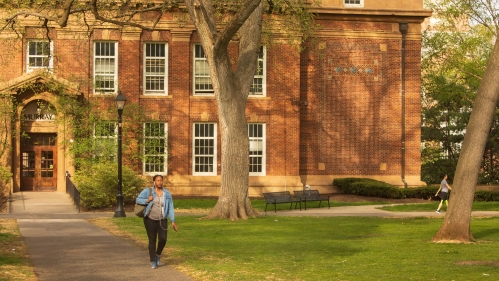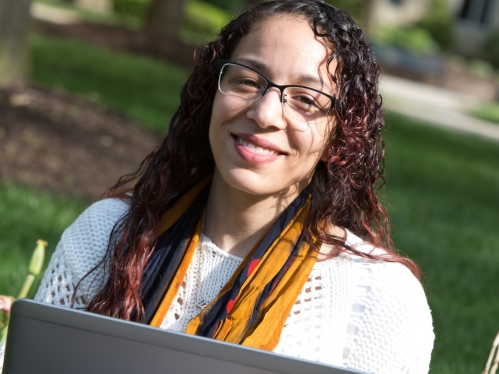
ACT Program Overview & Requirements
Learn about the ACT Certificate Program
For students in the MSW program, all six ACT courses will be embedded in the MSW program. These courses will substitute for the HBSE distribution course, the Advanced Clinical distribution course, and all three electives. In addition, students will be required to take one extra course, which can be taken during a summer session or during the regular academic calendar.
Note that the ACT Curriculum was revised in 2019. The new curriculum is shown below and in the Curriculums at a Glance for MSW students, Advanced Standing students, and Postgrads; the original coursework may be found in the Curriculum at a Glance titled "MSW/ACT Students (original curriculum)". A new course sequencing document is also provided.
For postgraduates - those who have earned a clinical degree at the masters or doctoral level - the six courses can be completed on a part-time basis within one year.
Added together, these six courses will provide all the education hours needed for LCADC licensing. The six educational courses in the ACT program are as follows (click each course to view the syllabi):
- Understanding Addictive Behaviors - 19:910:514
Examines psychosocial development, through the lifecourse, highlighting the factors influencing the ways in which individuals develop and recover from addictive behavior. (Elective) - Gambling Counseling and Special Topics - 19:910:510
(Elective) - Clinical Social Work: Addictive Behaviors I - 19:910:522
Covers the alliance, assessment, and diagnosis of substance use disorders and co-occurring disorders.(Advanced Clinical Distribution) - Clinical Social Work: Addictive Behaviors II - 19:910:597
Prepares clinicians in the use of theoretically driven, evidence-based treatments in multiple modalities. (Elective) - Case Management in Addictions Practice - 19:910:598
Covers making connections with the context of clients’ lives. (Elective) - Professional Development and Responsibility in Addictions Practice - 19:910:599
Prepares students for ethical practice, use of supervision, professional obligations, testing, and job-seeking. (Elective)
Generally, students can choose from Saturday courses on Camden or Newark campuses, and Friday classes on the New Brunswick campus. Classes will meet from 9 a.m. to 4 p.m., four times during the semester, with additional online content to complete the required contact hours.
ACT Course Sequencing document
Click on a link below to view the Curriculum at a Glance for:
- MSW/ACT Students
- MSW/ACT Advanced Standing Students
- ACT Postgrads
- MSW/ACT Students (original curriculum)
ACT Policies for Students
ADDICTION COUNSELOR TRAINING (ACT) Certificate Policies Note: There are NO stipends associated with this Certificate.
ACT Policies Selection Process
MSW students in good academic standing and post-graduates in direct practice-related disciplines are welcome to apply to the Addiction Counselor Training (ACT) Certificate Program. MSW students in the traditional (on campus) program may apply at any time but optimally in the year before they enter their advanced year practicum placement; students in the traditional (on campus) Advanced Standing MSW program should apply to ACT upon their acceptance to the MSW program. ACT is a highly competitive program and acceptances will be limited. Applications will be reviewed by ACT Program staff and will be carefully evaluated based on a number of criteria, including academic achievement, commitment to the field of addiction, prior experience, and scheduling availability. (Note: the majority of ACT courses are taught online synchronously with four virtual class meetings scheduled on Fridays or Saturdays - you must attend all class meetings.) Application decisions will be emailed to all applicants after review. Decisions are final and confidential, and individual decisions are unable to be discussed with applicants. As part of the application process, ACT Program staff may also review applicants' transcripts and first year/undergraduate practicum evaluations.
We strongly recommend that applicants in recovery from addictions be secure in their own recovery for a period of at least two (2) years prior to application to the program in order to best protect the interests of the clients we serve.
Policy Post Acceptance
Placement Process: Once accepted into the ACT Program, students will be placed in an ACT-focused field agency for their advanced year practicum placement (and possibly for their generalist placement, if applicable). It is important to note that program staff will make an effort to accommodate student preferences with regard to schedule and location; however, it is the students’ responsibility to successfully complete practicum. Due to the demands placed on staff and the number of placements, it will generally not be possible to change practicum placements for reasons other than unavailability of the placement agency. During the placement process, the student will be referred to an ACT field agency by the ACT practicum staff for an interview. Failure to be accepted into the first agency will lead to a referral to the second agency. The Program will refer the student to a maximum of two agencies. The student will be required to meet with the Program
faculty after the first rejection, to understand and address challenges that may be interfering with the internship acceptance process. Failure to secure the internship at the second agency will result in the student being dismissed from the ACT Program. If the student attends an interview for an initial placement and is accepted but decides not to accept the placement (for personal or professional reasons) at that agency, s/he will be provided one more referral to an agency for an interview. The student will be required to accept the internship in the second placement if accepted by the agency and to remain in that placement until completion of practicum. Program staff will review students’ practicum placement progress on an ongoing basis. The ACT Program faculty reserves the right to terminate students from the program based on difficulties in practicum placements. It is the responsibility of the student to ensure sufficient scheduling flexibility to accommodate practicum placements.
**Please note that field agencies' criteria may include items such as (but not limited to) a set length of time in recovery for applicants with a history of addictions; abstinence from substances that may include maintenance medications (such as Buprenorphine, Naloxone, Methadone) and medical marijuana; drug testing; and a criminal background check. These differing criteria reflect divergent philosophies/approaches/shifting policies in the field that will be addressed in your coursework. If students are in need of a disability accommodation for practicum education, please contact the Rutgers University Office of Disability Services at https://ods.rutgers.edu. We (the ACT program and the RU SSW) do not set nor can we influence these agency criteria. We will work with you to find the best fit agency, but as noted above we cannot guarantee student acceptance at a practicum agency and a successful placement.
Course work: The student is also expected to complete the six-course requirement for the Certificate [refer to course requirements for the ACT Program]. It is important to note that students are required to attend ALL sessions of EACH course and are not permitted to attend sessions in different course sections to accommodate their schedules. In cases of medical or other emergency as determined by the ACT Program Director, the staff will work to accommodate a student in another section; work requirements, personal holidays (aside from those specifically addressed in the University Religion Policy) and special events and/or conferences will not be considered emergencies requiring rescheduling. Students who fail to attend one or more class meetings of a course without approval of the Director will be required to drop and retake that course. Grounds for Termination: Failure to achieve a minimum grade of B in any ACT course or failure to successfully complete an ACT generalist or advanced year practicum placement will result in dismissal from the program. Failure to successfully complete the assigned practicum placement may include a termination initiated by the field agency, and/or the student and agency’s mutual agreement to terminate the practicum internship due to the student’s inability to fulfill the expectations and/or recommendations made by the field agency and the Rutgers Practicum faculty. This may refer to an “F” grade or to a “W” grade where recommendations made to address concerns that resulted in the first
practicum termination were not followed. The ACT Program retains the right to terminate students for violations of academic integrity, the University Code of Student Conduct, the NASW Code of Ethics, or other factors that bear on the ability to maintain the standard of care in social work and addictions counseling practice. Accepted students may be required to go through a background check, drug test, and/or to obtain medical clearance prior to beginning their practicum placements per agency requirements. If a student defers acceptance to the MSW program after being admitted to the ACT Program, s/he will have to reapply to ACT when beginning the MSW program. If a student is dismissed or suspended from the Rutgers MSW program for any reason, s/he is automatically dismissed from the ACT Program. Should the student be reinstated to the MSW program, s/he will not be automatically reinstated to the ACT Program and must reapply. If an MSW student takes a Leave of Absence (LOA) from the MSW program for up to two semesters, s/he will remain in the ACT Program and will not have to reapply when MSW studies are resumed. Prior to returning from a LOA, the student must notify the ACT Program of her/his imminent return by emailing ACT@ssw.rutgers.edu.
Students may opt to withdraw from the ACT Program at any time and without any penalty by giving written notice to the ACT Program by emailing ACT@ssw.rutgers.edu.


Licensure Preparation
ACT Practicum Learning Overview
ACT students must complete their practicum hours at a state-licensed substance abuse treatment organization to be eligible for the ACT certificate. Social work students will be placed through our practicum learning office; students in other clinical disciplines will complete their practicum through their own schools, but in coordination with ACT to insure that they are placed at a site that meets ACT requirements.
Postgraduates with a degree in a clinical discipline may choose to fulfill the experience hours required for the certificate by requesting and paying for a postgrad ACT practicum or by using their work hours at their place of employment, if it qualifies. A qualified agency is one that is licensed by the state of NJ for substance abuse treatment or one that is licensed by the state of NJ for mental health treatment that also has an addictions treatment program.
ACT MSW students will receive supervision by a clinician who holds an LSW or LCSW and an LCADC. In some cases, MSW students might have two supervisors, one with each credential. Because social work graduates are preparing for both the LCSW and the LCADC, it is important to have both kinds of supervision.
ACT students not in the MSW program will receive supervision by someone in the appropriate discipline.
All students will receive supervised work hours in the 12 core functions, and these hours will be documented for the LCADC application. For the LCSW or other clinical mental health licenses, the supervised hours begin accruing after graduation.
Most students will complete the 300 supervised hours requirement for the LCADC. However, the license also has a 3000 related work hours requirement, and the practicum(s) will cover some, but not all, of this. For students with previous employment in an addictions treatment facility, those hours will count, too, if they can be documented. It will be different for each person, so the licensed practicum learning instructor can help you calculate all of this information.


Advisement
Students in the ACT program are guided by qualified professionals with years of experience teaching, training, researching and providing clinical services. The faculty, staff, and instructors, many of whom continue to work in the field of addictions, are committed to ensuring the students have a quality educational experience and are prepared at the time of graduation.
ACT students should contact their academic advisor with questions about registration and what courses to take OR email ACT@ssw.rutgers.edu


